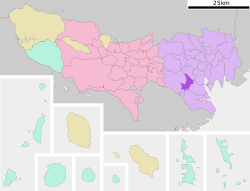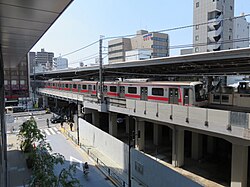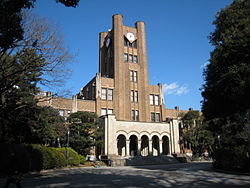Meguro
 From Wikipedia - Reading time: 15 min
From Wikipedia - Reading time: 15 min
This article needs additional citations for verification. (March 2014) |
Meguro
目黒区 | |
|---|---|
| Meguro City | |
 Location of Meguro in Tokyo Metropolis | |
| Coordinates: 35°38′N 139°41′E / 35.633°N 139.683°E | |
| Country | Japan |
| Region | Kantō |
| Prefecture | Tokyo Metropolis |
| Government | |
| • Mayor | Eiji Aoki |
| Area | |
• Total | 14.67 km2 (5.66 sq mi) |
| Population (October 1, 2020[1]) | |
• Total | 288,088 |
| • Density | 19,637/km2 (50,860/sq mi) |
| Time zone | UTC+09:00 (JST) |
| Website | www |
| Symbols | |
| Bird | Great tit |
| Flower | Lespedeza |
| Tree | Castanopsis |
Meguro (目黒区, Meguro-ku; Japanese pronunciation: [meꜜ.ɡɯ.ɾo, -ŋɯ.ɾo, me.ɡɯ.ɾoꜜ.kɯ, -ŋɯ.ɾoꜜ.kɯ][2][a]) is a special ward in the Tokyo Metropolis in Japan. The English translation of its Japanese self-designation is Meguro City.[3][4] The ward was founded on March 15, 1947.
Meguro is predominantly residential in character, but is also home to light industry, corporate head offices, the Komaba campus of University of Tokyo as well as fifteen foreign embassies and consulates. Residential neighborhoods include, Jiyugaoka, Kakinokizaka, and Nakameguro. As of May 1, 2015, the ward has an estimated population of 277,171 and a population density of 18,890 persons per km2. The total area is 14.67 km2.
Meguro is also used to refer to the area around Meguro Station, which is not located in Meguro ward, but in neighboring Shinagawa's Kamiōsaki district.[5]
History
[edit]The Higashiyama shell mound in the north of the ward contains remains from the Paleolithic, Jōmon, Yayoi, and Kofun periods.
The area now known as Meguro was formerly two towns, Meguro proper and Hibusuma, all parts of the former Ebara District of Musashi Province. The two were merged into a Meguro ward for Tokyo City in 1932 and since then the ward has remained with no alterations to its territory.[6]
The name "Meguro", meaning "black eyes", derives from the Meguro Fudō (Black-eyed Fudō-myōō) of Ryūsenji. The Meguro Fudō was one of five Fudō-myōō statues placed at strategic points on the outskirts of Edo in the early seventeenth century by the abbot Tenkai, an advisor to Tokugawa Ieyasu, to provide protection for the new capital of the Tokugawa shogunate.[7] Each statue had eyes of a different color. (Mejiro, a district in Toshima ward, is named for the white-eyed Fudō-myōō).
Geography
[edit]
Four other special wards surround Meguro. They are Shibuya (to the northeast), Setagaya (to the west), Ōta (to the south), and Shinagawa (to the southeast).
Districts and neighborhoods
[edit]
|
|
Politics and government
[edit]
Meguro ward government is led by the city assembly with 36 elected members with current terms from May 1, 2011, to April 30, 2015. The chairman of the council is Yoshiaki Ito.[citation needed] The mayor is Eiji Aoki, an independent. His term lasts until April 24, 2016.[citation needed]
Elections
[edit]Sightseeing and local landmarks
[edit]


Green spaces
[edit]- Meguro River
- Komaba Park, Komaba
- Komabano Park, Komaba
- Komazawa Olympic Park
- Rinshi-no-mori Park
- Meguro Sky Garden, Ohashi Linear roof garden park spiraling 35 meters above street level covering the junction of two major expressways.
- Saigoyama Park, Aobadai
- Sugekari Park, Aobadai
- Nakameguro Park and Nature Center
- Himonya Park, Himonya
Cultural institutions
[edit]- Tokyo Metropolitan Museum of Photography
- Meguro Museum of Art, Tokyo
- Meguro Persimmon Hall, concert and performance arts venue[8]
- Meguro Parasitological Museum
- Japanese Folk Crafts Museum
- Chosenin Temple Contemporary Sculpture Museum
- Meguro Gajoen, a landmark historic hotel
Religious institutions
[edit]- Himonya Catholic Church[9]
- St. Michael's Catholic Church (German Language)[10]
- Himonya Hachiman Shrine
- Ōtori Shrine
- Ryūsenji (Meguro Fudo temple)
- Yūten-ji Temple
- St. Paul's Church, Gohongi (Anglican Church in Japan)[11]
- Masjid Indonesia Tokyo
- Gohyaku Rakanji Temple
Transportation
[edit]
Rail
[edit]- Tokyu Corporation
- Tōyoko Line: Nakameguro - Yūtenji - Gakugei-daigaku - Toritsu-daigaku - Jiyūgaoka
- Ōimachi Line: Jiyugaoka - Midorigaoka - Ōokayama
- Meguro Line: Ōokayama - Senzoku
- Den-en-toshi Line: Ikejiri-Ōhashi
- Keio Corporation Keiō Inokashira Line: Komaba-Todaimae
- Note: Meguro Station (JR East, Tokyu Meguro Line, Tokyo Metro Namboku Line, Toei Mita Line) is in Shinagawa, not Meguro.
Highways
[edit]- Route 3 (Shuto Expressway) Shibuya radial route (Tanimachi JCT – Yoga)
- Central Circular Route C2. Completed in 2016 this deep level subterranean expressway connect the Yamate Tunnel as far as the Bayshore Route in Shinagawa
Education
[edit]
Colleges and universities
[edit]- University of Tokyo Komaba Campus
- Institute of Science Tokyo
- Note: Tokyo Gakugei University and Tokyo Metropolitan University were formerly in Meguro.
- Tokyo College of Music
Public schools
[edit]Metropolitan high schools are operated by the Tokyo Metropolitan Government Board of Education.
- Kokusai High School (Kokusai means "International" in Japanese)
- Komaba High School
- Meguro High School
- Geijutsu High School (Closed in 2012)
In addition the metropolis operates a consolidated junior and senior high school in Meguro called Ōshūkan Secondary School.
Municipal elementary and junior high schools are operated by the Meguro City Board of Education.
Municipal junior high schools:[12]
- Meguro 1st Junior High School (第一中学校)
- Meguro 7th Junior High School (第七中学校)
- Meguro 9th Junior High School (第九中学校)
- Meguro 10th Junior High School (第十中学校)
- Higashiyama Junior High School (東山中学校)
- Meguro Chuo Junior High School (目黒中央中学校)
- Meguro Nishi Junior High School (目黒西中学校)
- Otori Junior High School (大鳥中学校)
Municipal elementary schools:[13]
- Aburamen Elementary School (油面小学校)
- Dendo Elementary School (田道小学校)
- Fudo Elementary School (不動小学校)
- Gekkohara Elementary School (月光原小学校)
- Gohongi Elementary School (五本木小学校)
- Haramachi Elementary School (原町小学校)
- Higashine Elementary School (東根小学校)
- Higashiyama Elementary School (東山小学校)
- Ishibumi Elementary School (碑小学校)
- Kamimeguro Elementary School (上目黒小学校)
- Karasumori Elementary School (烏森小学校)
- Komaba Elementary School (駒場小学校)
- Midorigaoka Elementary School (緑ケ丘小学校)
- Miyamae Elementary School (宮前小学校)
- Mukaihara Elementary School (向原小学校)
- Naka Meguro Elementary School (中目黒小学校)
- Nakane Elementary School (中根小学校)
- Ookayama Elementary School (大岡山小学校)
- Shimomeguro Elementary School (下目黒小学校)
- Sugekari Elementary School (菅刈小学校)
- Takaban Elementary School (鷹番小学校)
- Yakumo Elementary School (八雲小学校)
International schools
[edit]Economy
[edit]Company headquarters
[edit]- Amazon Japan head office
- Books Kinokuniya[14]
- Don Quijote discount store chain head office
- LDH (Headquarters for EXILE & other Dance Units)
- Makino[15]
- New Japan Pro-Wrestling head office
- Ribera Steakhouse
- Stanley Electric[16]
- TopTour Corporation
- Unilever Japan, head office
- Walt Disney Japan, head office
International relations
[edit]Friendship cities
[edit] Dongcheng District, Beijing, People's Republic of China (since 1991[17])
Dongcheng District, Beijing, People's Republic of China (since 1991[17]) Jungnang District, Seoul, Republic of Korea (since 2013[18])
Jungnang District, Seoul, Republic of Korea (since 2013[18])
Diplomatic missions in Meguro
[edit]
 Embassy of the People's Democratic Republic of Algeria (at Higashigaoka)
Embassy of the People's Democratic Republic of Algeria (at Higashigaoka) Embassy of the Republic of Azerbaijan (at Mita)
Embassy of the Republic of Azerbaijan (at Mita) Embassy of the Arab Republic of Egypt (at Aobadai)
Embassy of the Arab Republic of Egypt (at Aobadai) Embassy of the Gabonese Republic (at Higashigaoka)
Embassy of the Gabonese Republic (at Higashigaoka) Embassy of the Republic of Kenya (at Yakumo)
Embassy of the Republic of Kenya (at Yakumo) Embassy of the Islamic Republic of Mauritania (at Gohongi)
Embassy of the Islamic Republic of Mauritania (at Gohongi) Embassy of the Federated States of Micronesia (at Meguro)
Embassy of the Federated States of Micronesia (at Meguro) Embassy of Nepal (at Shimomeguro)
Embassy of Nepal (at Shimomeguro) Embassy of the Independent State of Papua New Guinea (at Shimomeguro)
Embassy of the Independent State of Papua New Guinea (at Shimomeguro) Embassy of the Republic of Poland (at Mita)
Embassy of the Republic of Poland (at Mita) Embassy of the Republic of Senegal (at Aobadai)
Embassy of the Republic of Senegal (at Aobadai) Embassy of the Republic of the Sudan (at Yakumo)
Embassy of the Republic of the Sudan (at Yakumo) Royal Thai Embassy Military Attaché Office (at Shimomeguro)
Royal Thai Embassy Military Attaché Office (at Shimomeguro) Embassy of the Togolese Republic (at Yakumo)
Embassy of the Togolese Republic (at Yakumo)
Notable people from Meguro
[edit]- Yumiko Fujita, actress
- Waka Inoue, model, actress
- Risa Tsubaki, voice actress
- Toru Iwatani, arcade game designer, most notable for Pac-Man and Pole Position
- Shigeru Izumiya, folk singer, entertainer (born in Aomori, Aomori, but raised in Meguro)
- Masako, Empress of Japan (born in Toranomon, but raised in Meguro)
- Yukio Sakaguchi, mixed martial arts fighter and professional wrestler
- Kazuo Tokumitsu, television presenter
- Renhō, politician
Notable residents
[edit]- Takuya Kimura, singer and actor in male idol group SMAP
- Shizuka Kudo, popular singer and wife of Takuya Kimura (Originally from Hamura, Tokyo)
- Keisuke Kuwata, singer with Southern All Stars (Originally from Chigasaki, Kanagawa)
- Nobuyo Ōyama, voices the anime character Doraemon (Originally from Shibuya, Tokyo)
- Miyu Uehara, gravure idol, found dead in her Meguro apartment (Originally from Tanegashima, Kagoshima)
- Halca & Yucali of the hip-hop duo Halcali[19]
- Shori Sato, singer and actor in male idol group Sexy Zone
- Suehiro Maruo, Manga artist, one of the best-known exponents of Ero Guro (Originally from Nagasaki, Nagasaki)
Notes
[edit]- ^ The name of this ward is pronounced like this with an accent. The common noun for the Bonin white-eye is pronounced [me.ɡɯ.ɾo, -ŋɯ.ɾo] without an accent.
References
[edit]- ^ "Population by District". Tokyo Statistical Yearbook. Retrieved 2022-07-15.
- ^ NHK Broadcasting Culture Research Institute, ed. (24 May 2016). NHK日本語発音アクセント新辞典 (in Japanese). NHK Publishing.
- ^ 目黒区方式ホームページ [Official Homepage of Meguro City, Japanese]. Retrieved 2011-04-26.
- ^ "English: Meguro City (Official English webpage for Meguro City)". Meguro City. Archived from the original on 2008-11-03.
- ^ "目黒駅は目黒区じゃない!? 首都圏「住所と合ってない駅名」意外と多いワケ".
- ^ "市町村合併でおなじみ「役所の位置」問題 都心の目黒区でも同様のことが起きていた". Urban Life Tokyo.
- ^ Paul Waley, Tokyo: City of Stories (Tokyo: Weatherhill, 1991), 237.
- ^ トップページ ― めぐろパーシモンホール/中目黒GTプラザホール. Persimmon.or.jp. Retrieved 2014-04-07.
- ^ "Himonya Catholic Church". Home.m06.itscom.net. Retrieved 2014-04-07.
- ^ "Katholische Deutschsprachige Gemeinde". Sankt Michael Tokyo. Retrieved 23 April 2014.
- ^ 日本聖公会東京教区聖パウロ教会. Nskk.org. Retrieved 2014-04-07.
- ^ "区立中学校". Meguro. Retrieved 2022-11-08.
- ^ "区立小学校". Meguro. Retrieved 2022-11-08.
- ^ "Headquarters & Main Contacts Archived 2011-08-03 at the Wayback Machine." Books Kinokuniya. Retrieved on July 25, 2011. "Dept.General Affairs Dept. 3-7-10 Shimomeguro Meguro-ku, Tokyo 153-8504"
- ^ "事業所・営業所 | Makino". www.makino.co.jp.
- ^ "Corporate overview Archived 2020-01-04 at the Wayback Machine." Stanley Electric. Retrieved on March 7, 2019.
- ^ "友好都市 北京市東城区(旧崇文区)" (in Japanese). Meguro City Government. 2017-11-27. Retrieved 2023-10-28.
- ^ "ソウル特別市中浪区と友好都市協定を締結しました" (in Japanese). Meguro City Government. 2019-08-25. Retrieved 2023-10-28.
- ^ "プロフィール | HALCALI | ソニーミュージックオフィシャルサイト". Sony Music.
External links
[edit]- Meguro City Official Website (in Japanese)
 KSF
KSF







